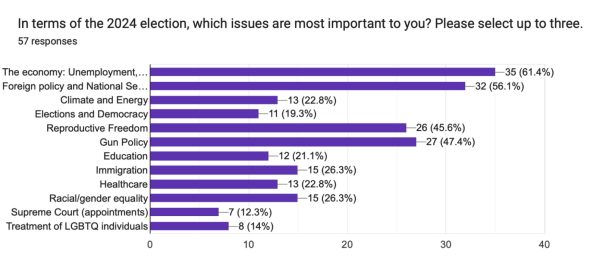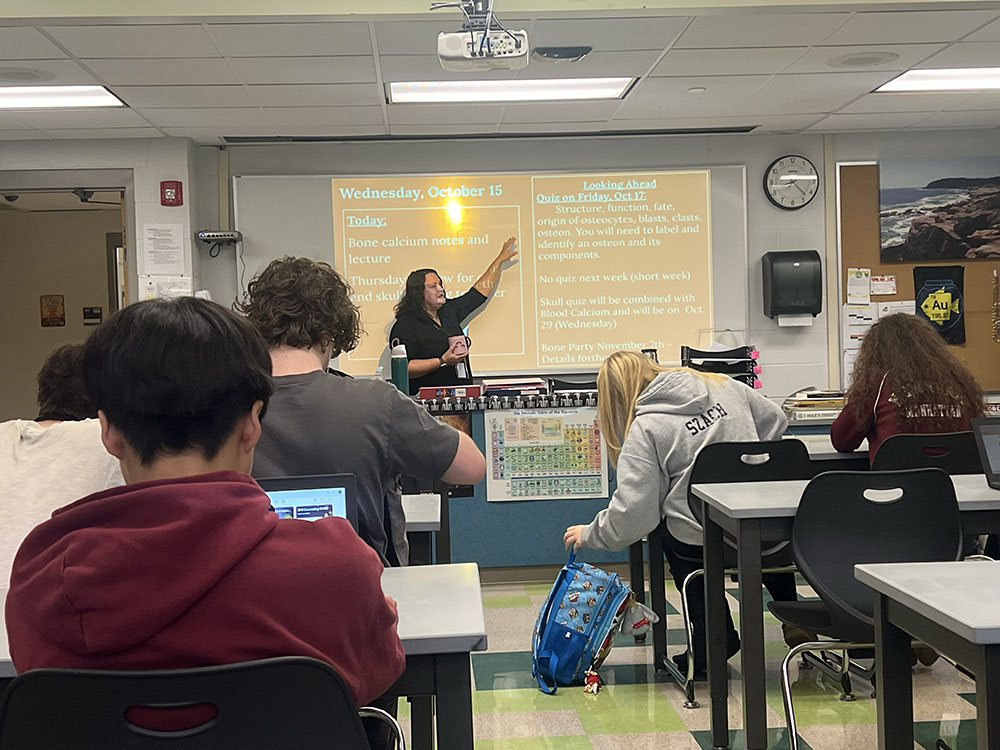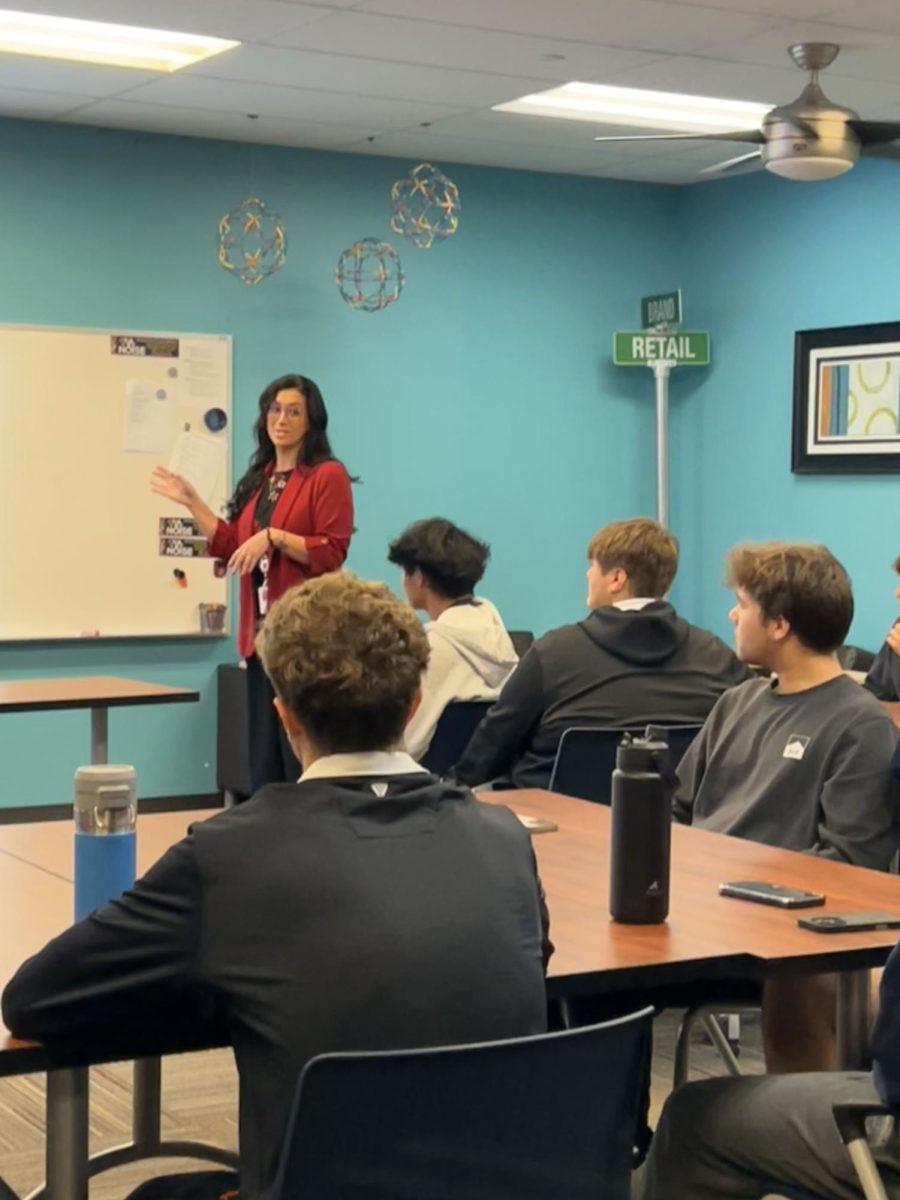Millions of voters across the country will vote on Nov. 5 in one of the most high-stakes presidential elections in United States history.
Vice President Harris and former president Trump differ on a multitude of hot-button issues that have the potential to determine the election. These include how to strengthen our post-COVID economy, reproductive freedom after the overturn of Roe, foreign policy regarding the wars in Ukraine and Gaza and gun policy in an era when mass shootings have become normalized.
With 8 million members of Generation Z reaching voting age in 2024, young voters are bound to have a significant impact on this election, and candidates are responding. In fact, the 2024 election has seen an increase in the use of social media campaigning, as Vice President Harris’ campaign quickly became associated with Charlie XCX’s Brat album after the British pop artist tweeted “kamala IS brat” over the summer.
Danny Fersh, the Director of Communications for Students Learn Students Vote Coalition, described how Gen Z’s political involvement has evolved in recent years.
“In the 2016 presidential election, about 52% of all college students voted, and that lagged behind the general population which voted at about 59%,” he said. “Fast forward to 2020, the general population voted at about 67%, and college students voted about 66%, so they essentially caught up with the general population.”
“What stands out to me about that increase is that the college student voter turnout rate increased twice as much as the general population over the past two presidential elections,” Fersh continued. “Gen Z is maybe the most educated and passionate generation of young voters in our country’s history, and there’s every reason to believe they are going to show up in force in the 2024 election.”
In a Beachcomber survey, 57 Beachwood students selected the economy, foreign policy and national security, gun policy and reproductive freedom as the issues most important to them.
Beachwood Senior Radha Pareek, who identifies as an independent, explained her opinions on Vice President Harris’ proposed approaches to handling the economy.
“I think [Kamala Harris is] really trying to set herself apart from the economic approaches used during the Biden administration, and she’s really rebranded that by using the phrase of creating an opportunity economy,” she said.
One of Harris’ principal efforts is to make housing more accessible. According to her campaign website, as President, Harris would cut red tape to expedite the time in which houses are built, penalize corporations who hike up housing prices for potential homebuyers, and put forth a comprehensive plan that would result in the construction of over three million new rental units.
Pareek shared her views on Harris’ economic proposals with respect to housing.
“One of the key economic issues is affordable housing, and because prices for homes are really sky high, coming from a family that’s been looking for a house for a long time, that has really affected us,” Pareek said.
Pareek also appreciates Harris’ plan to give $25,000 in down payment to first time homebuyers, which is expected to give over 1 million new homebuyers the funds they need to purchase a home.
In a statement from his press secretary, Ohio Senator Sherrod Brown (D), who is currently running for re-election shared why he believes the economy is important to young voters.
“Young voters want to make sure they have a path to the middle class, that their hard work will pay off, and that they’ll be able to eventually purchase a home and start a family without having to take on massive debt,” the statement said. “They want to feel supported and included in their communities, and they reject divisive politics that do nothing but divide and distract us from the real issues.”
Conversely, one of President Trump’s key economic proposals has been to increase tariffs in order to decrease the trade deficit. According to Trump’s campaign website, if elected president, he would pass the Trump Reciprocal Trade Act, which would impose tariffs on countries at an equal or greater rate than they impose on us to ensure “reciprocal and fair trade.”
Pareek expressed why she is wary about Trump’s tariff proposals.
“A major part of his plan has been talking about increasing tariffs,” she said. “And I think a lot of that is rooted in the idea of economic and potentially even diplomatic isolationism, but I think a lot of his voter base and he himself are kind of forgetting that not only do our allies need us, but we also need our allies.”
Many economists warn of the potential consequences of Trump’s proposed tariffs. For example, A brief published by the Peterson Institute for International Economic Policy argues that the tariffs would result in considerable costs for American households and have a negative impact on the economy.
“If executed, these steps would increase the distortions and burdens created by the rounds of tariffs levied during the first Trump administration (and sustained during the Biden administration), while inflicting massive collateral damage on the US economy,” the brief states.
56.1% of the respondents to the Beachcomber survey listed foreign policy and national security as an issue that holds a degree of importance to them. This is approximately six percentage points below the national average of registered voters who reported foreign policy as an issue that is “very important” to them, which is 62%, according to a poll conducted by the Pew Research Center.
Additionally, 19 of the respondents, approximately 33%, listed the United States’ relationship with Middle Eastern countries, specifically Israel and Palestine, as particularly important to them.
Jenna Wechsler, a former Assistant Professor of Political Science at Wheaton College, explained how Vice President Harris’ attitudes towards foreign policy and national security issues, specifically regarding the ongoing war in Gaza, could affect Gen Z.
“I think something that Gen Z is paying a lot of attention to right now is the war in Gaza, which has been a really tough issue on a number of grounds,” she said. “Of course, you have the terrorist attack in Israel, and then you have the reaction. So, I think the Harris campaign is trying to straddle a difficult line, condemning what’s going on in Gaza, but also supporting the Israeli government.”
Beachwood senior Isaac Gorodeski, who doesn’t affiliate with either major party, explained why he believes former President Trump is a prominent choice for Pro-Israel voters.
“I trust Trump more because while both he and Kamala have expressed support for Israel, Kamala has tried to appease both sides,” Gorodeski wrote in an email. “When it comes to a foreign war between an American ally and a terrorist entity along with a domestic struggle with protesters and some organizations that are funded by Iran and in open support of a terrorist organization, I’d want the person who fully supports Israel rather than both sides.”
Gorodeski also detailed how he and many Israelies believe the Biden-Harris Administration has harmed Israel.
“I’ve also seen and talked to Israelis first hand about a lack of progress in the war due to the slowed sending of funds to Israel, along with leaders such as Biden and Kamala calling for a ceasefire deal without acknowledging that Hamas has rejected every U.S. backed deal put forth to them,” he wrote.
Gorodeski also stated that he believes the Iran Nuclear Deal, a joint plan negotiated under former President Obama between the U.S, European Union and Iran in 2015 to reduce the amount of uranium available to Iran to build nuclear weapons, ultimately harmed Israel.
He also explained how he trusts Trump because of the former president’s aid in creating the Abraham Accords, a joint agreement established in 2017 between the U.S, Israel, and the United Arab Emirates that sought to establish peace and stability in the Middle East. Additionally, former President Trump moved the United States embassy to Jerusalem.
“Israel is a sovereign nation with the right like every other sovereign nation to determine its own capital,” Trump said. “Acknowledging this as a fact is a necessary condition for achieving peace.”
Gorodeski shared additional reasons why he does not believe Harris will strengthen the United States’ alliance with Israel.
“Under the Biden-Harris administration [they] have continued large trade which has greatly helped Iran’s economy, the proxy which funds Hamas, Hezbollah in Lebanon, and the Houthis in Yemen,” he wrote.
According to a poll conducted by the Pew Research Center, younger Americans are more likely to be critical of Israel’s reasons for fighting Hamas than older Americans, and are less supportive of U.S. military aid to Israel.
In the survey, 45.6% of respondents, or 26 students, listed reproductive freedom as an issue that holds importance to them,
Former president Trump and Vice President Harris hold contrasting views on both issues. Regarding reproductive freedom, Trump has boasted his integral part in the overturn of Roe, and has described himself as ‘the most pro-life president in American history’.
Trump revealed his plans regarding abortion in a speech at the Faith & Freedom Coalition Gala in Washington D.C in June of 2023.
“…When I’m re-elected, I will continue to fight against the demented late-term abortionists in the Democrat Party who believe in unlimited abortion on demand and even executing babies after birth,” Trump said.
On the other hand, Vice President Harris has taken an affirmative stance on abortion and reproductive freedom.
“As President, she will never allow a national abortion ban to become law. And when Congress passes a bill to restore reproductive freedom nationwide, she will sign it,” the Harris campaign website states.
Beachwood junior Lorena Tovanche, who identifies as a Democrat, shared why Harris’ position on the issue resonates with her.
“Kamala Harris’ stance is not a liberal one, it is simply the belief that women should have the right to what happens to their body,” she wrote in an email. “If she wins the election, she declares that she plans on reinstating Roe V. Wade, thus giving women the protection that they seek once more.”
Former president Trump recently claimed that states are permitting abortions late and even after pregnancies, a statement found to be a false claim by fact checkers.
Tovanche explained why she views Trump’s rhetoric as harmful.
“Trump’s belief is that abortions are allowed in the seventh, eighth or even ninth month of pregnancy, which is very rare, but when it does happen it is solely for the protection of the mother carrying the child,” she continued. “He would want to pass a nationwide abortion ban, and even take away IVF which is completely nonsensical, as it would take away the chance of being a parent from people who actually want it, and are not forced into parenthood.”
Another important issue for young voters is gun policy, which 47.4% of respondents to the Beachcomber survey listed as an issue that is important to them.
“I think gun policy is really important, and though I do see who people find the 2nd Amendment right is important to a lot of gun owners, there needs to be some sense of protection and background checking to protect the American people from potential mass-shooters and mentally ill people who should not be in possession of deadly assault weapons, especially with the prevalence of school shootings in recent years,” one respondent wrote. “It is truly just heartbreaking and angering.”
Harris and Trump’s gun policy proposals vary greatly.
According to Harris’ campaign website, if elected president, she would ban assault weapons, require universal background checks, and allocate more funds towards law enforcement to reduce violent crime.
Conversely, Trump has taken a more affirmative stance on guns, describing himself as the “best friend gun owners have ever had in the White House” to the NRA in Feb. 2024. During his presidency, he signed a bill that nullified Obama-Era policies that restricted individuals with severe mental illnesses from buying guns. He also rejected the chance to advocate for a national concealed carry law.
Beachwood senior Madeleine Mehler shared why she aligns more closely with the Harris-Walz campaign’s proposals to gun policy.
“There has been substantial evidence that shows that states with stricter gun laws have less gun violence and fewer deaths caused by guns,” she said. “Trump and Vance have a hands-off approach when it comes to gun restrictions, and I think that’s an inappropriate approach when on average over 300 people are shot daily.”
Mehler also explained how she appreciates how the Biden-Harris Administration was able to establish the Office of Gun Violence Prevention, which aims to reduce gun violence throughout the country through executive and legislative action.
Additionally, she acknowledged how Harris supported the Bipartisan Safer Communities Act, which proposed federal changes to firearm laws, expanded universal background checks, and introduced new criminal offenses, while also protecting Americans’ Second Amendment rights.
As previously mentioned, Gen Z is expected to have a noteworthy impact on the election. As a result, both campaigns have utilized social media in their campaigns in an effort to attract young voters. The Harris campaign has embraced memes and trends on the team’s TikTok account, Kamala HQ, while Trump has maintained his strong social media presence on X, TikTok, Instagram, and Truth Social.
Solenne Montgomery, a Virginia native and Student Advisory Board member for Campus Vote Project, explained how Campus Vote Project aims to increase youth voter turnout.
“Campus Vote Project is a part of the Free Election Center, which is a national, nonpartisan voting rights and election reform organization that works to remove barriers to registration and voting,” she said.
Montgomery shared what strategies have been the most effective in encouraging young people to vote, as she led an initiative during her time at Virginia State University to increase youth voter turnout.
“I did a voter registration education block party, and we had music, free food and performances by organizations on campus, like the National Pan-Hellenic Council,” she said. “We [also] had voting organizations like Next Gen America, Campus Vote Project, and the Southern Christians Leadership Conference of Greater Richmond.”
She also explained that she believes fun and interactive initiatives are more successful at getting students to participate and register to vote, as they help to foster a sense of community.
Montgomery said her voter registration event registered around 60 students to vote.
Although the percentage of young people who voted in the 2020 presidential election increased from 2016, ½ of youth still did not vote in the 2020 election.
Fersh described the ‘two prong approach’ that Students Learn Students Vote Coalition uses to engage with students who may feel apathetic towards the political process.
“The first prong is listening,” he said. “There are very real reasons why people may be disappointed with our electoral system, the people leading our country, and political candidates on the ballot,” Fersh said.
He then explained that taking the time to listen to issues that young people are passionate about and the reasons for their dissatisfaction can guide them towards a place of action.
Fresh then described how Students Learn Students Vote Coalition uses local elections to engage politically disillusioned students.
“A lot of time, energy, and media coverage goes toward the most high profile national races, such as the presidential election, but the reality is that the elected officials that have the most impact on our day to day lives tend to be the ones at the local level,” he said. “When students are disillusioned with the candidates and the way issues are being adjudicated at the national level, we find that connecting their passions and interests with issues that are almost always being impacted by local forces helps them see that they have real agency and power with their vote and their voice.”
Senator Sherrod Brown hopes Gen Z will make a significant impact on this year’s election.
“Young Ohioans are future workers, educators, and leaders, and I know they understand the importance of making their voices heard in the upcoming election to determine the direction our state goes,” his statement said. “When young people vote, they have the power to decide our elections.”














![“My parents have always said that education is important. My parents are Chinese immigrants, I'm Chinese American, [and that's a] value that has always been ingrained in our community,” said Senior Lyndia Zheng, pictured with Tony Zheng](https://bcomber.org/wp-content/uploads/2025/10/DSC_4244.jpg)
